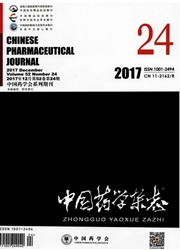

 中文摘要:
中文摘要:
目的制备肝素化磁介孔硅纳米粒,并负载多柔比星,考察该载药系统的体外释药及抗癌活性。方法用相转移法和溶胶-凝胶法合成单分散核/壳结构的磁介孔硅纳米粒(MMSNs),以共价结合的方法合成肝素化磁介孔硅纳米粒,然后进行药物在肝素化磁介孔硅纳米粒上的负载与体外释放实验、肝素化磁介孔硅纳米粒的细胞摄入实验及肝素化磁介孔硅纳米粒负载多柔比星的体外细胞学实验。结果肝素化磁介孔硅纳米粒能够明显延缓多柔比星的释放,能够被肝癌细胞HepG2摄入、对HepG2细胞具有明显的杀伤作用、对碱性成纤维细胞生长因子诱导的HepG2细胞增殖具有明显的抑制作用。结论肝素化磁介孔硅纳米粒作为药物载体在传递抗肿瘤药物方面具有潜在的应用前景。
 英文摘要:
英文摘要:
OBJECTIVE To prepare doxorubicin-loased heparinized magnetic mesoporous silica nanoparticles( MMSNs-HP) and investigate their drug release profile and anticancer activity in vitro. METHODS Amino-modified MMSNs was synthesized by combining phase transfer method with sol-gel method firstly. Then heparin was conjugated with the above nanoparticles via carbodiimide chemistry to form MMSNs-HP. Finally,the following experiments were performed,such as loading / release of doxorubicin into / from MMSNs-HP in vitro,cellular uptake of MMSNs-HP by hepatoma cell HepG2 and cell cytotoxicity of doxorubicin-loaded MMSNs-HP.RESULTS MMSNs-HP was able to delay the release of doxorubicin significantly,penetrate into tumor cells,kill HepG2 cell,and inhibit the proliferation of HepG2 cells induced by basic fibroblast HepG2 cells( b FGF). CONCLUSION MMSNs-HP is a potential drug carrier for the delivery of antitumor drugs.
 同期刊论文项目
同期刊论文项目
 同项目期刊论文
同项目期刊论文
 Effect of core-substituted groups on sensing properties based on single micro/nanorod of perylenedii
Effect of core-substituted groups on sensing properties based on single micro/nanorod of perylenedii Heparinized magnetic mesoporous silica nanoparticles as multifunctional growth factor delivery carri
Heparinized magnetic mesoporous silica nanoparticles as multifunctional growth factor delivery carri 期刊信息
期刊信息
